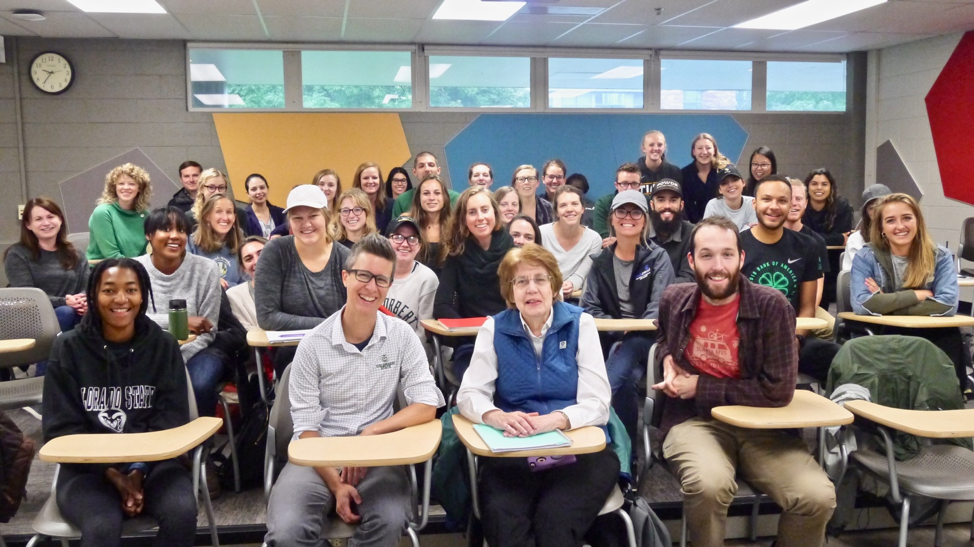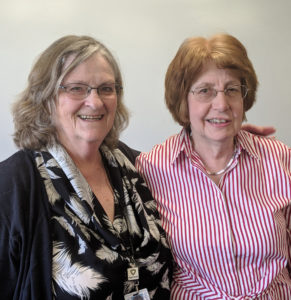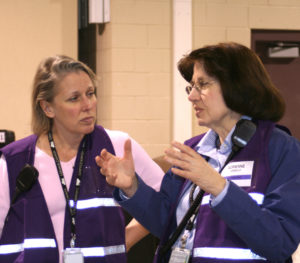
Adrienne LeBailly, center, with the rest of the “Epidemiology for Public Health” class.
Story by Megan Jansson
During the first day of the fall 2019 semester, Molly Gutilla asked the students in her “Epidemiology for Public Health” class to introduce themselves.
One introduction stood out among the rest, and that was Dr. Adrienne LeBailly. She introduced herself simply as Adrienne and that she was enrolled in the Lifelong Learner program at Colorado State University, which is a program that allows people 55 years and older to take classes at CSU for the joy of learning, free of cost. LeBailly went on to say that she had worked in public health previously, but at the time the class had no idea how impressive her resume really is.
Teacher turns doctor
LeBailly grew up in a suburb of Chicago, and from a young age she loved to learn and share what she had learned with others. She went to the University of Illinois, where she studied English. Her plan was to become a teacher, but she realized while student teaching during her last semester that teaching was not her life calling. She shifted gears, and because she also had a love for science, she decided to add a second degree, a B.S. in pre-medicine. In 1975, she went on to attend Rush Medical College.
In addition to the medical training she received at Rush, LeBailly had opportunities to learn about other aspects of health and medicine. She participated in a nearby summer program, “The Urban Preceptorship,” which was created and led by Dr. Quentin Young. The program was designed to teach medical students, health care professionals and community health workers about medical care in urban areas, treatment for people with low incomes and disabilities, prison health, community-based clinics and programs and government policies. Young was a physician, social activist and director of medicine at Cook County Hospital and would later be elected president of the American Public Health Association in 1988.

Along with working with Young, LeBailly participated in a Rush medical student group that advocated for health care coverage for all, fought against the rising costs of profit-driven medical care, and encouraged classmates not to accept “gifts,” or bribes, from pharmaceutical companies.
While LeBailly was working as a medical intern at Cook County Hospital, she saw many medical problems that could have been prevented or treated earlier, at far less cost to taxpayers than the end-stage efforts to rescue patients.
“I remember a young man who regularly injected heroin whose heart valves had been destroyed by bacterial growth from contaminated equipment and drugs,” she said. “He spent weeks in the ICU before dying. I couldn’t help thinking about how his health care costs compared to the costs of programs that might have prevented his drug use or at the least reduced the harm of his drug use.”
Such experiences sparked her interest in specializing in preventive medicine and public health and doing a preventive medicine residency after completing her medical internship. She received her MPH degree and did her residency at Johns Hopkins University.
First job

After graduating, LeBailly was hired as the health department director for the city of Waterbury, Connecticut, in 1984. She had a steep learning curve to understand how the city and the department operated, and she was hit with three union grievances on her first day on the job. With help from colleagues, staff and even a newspaper reporter, she learned how to navigate local leadership influenced by community perspectives, including political and religious viewpoints.
“It was a challenging environment to work in, but I was able to move forward in dealing with the newly recognized AIDS epidemic, addressing the concerns of environmental activists who had not trusted my predecessor, implementing community-wide screening programs for elevated cholesterol and colon cancer, and responding to emergencies, such as Hurricane Gloria,” she said.
Larimer County public health director
In 1987, LeBailly accepted a job as the Larimer County public health director and would go on to serve in that position for 31 years.
“One of the wonderful things about being a local public health official is that each day is so varied, working on such a wide range of public health problems with co-workers and community members, who bring an amazing range of knowledge and experience to solve problems together,” she said.
LeBailly helped educate communities in Larimer County about preventing the spread of AIDS before HIV was identified, and shortly after, when treatment options were very limited. She
also helped share information about a number of environmental exposures that generated public concern, and she worked with many partners to develop community health clinics for Larimer County’s uninsured and patients with low incomes. Additionally, she responded to numerous disease outbreaks and disasters over the years, including the 1990 CSU measles outbreak, which led to a law requiring measles vaccinations for all Colorado college students.
Lifelong learner

LeBailly retired this year and had heard about the Lifelong Learner program at CSU when she first arrived in Colorado. She did some research as she was getting closer to retirement and saw that the program was still offered.
“I was looking forward to being able to retire and take classes just for the enjoyment of learning, without the burden of test-taking, and tuition!” she said.
Shortly after doing this research, she ran into Gutilla at a colleague’s retirement event and asked about good courses to take at CSU.
“She offered to let me come to her epidemiology class, and I jumped at the opportunity,” LeBailly said. “I figured that there were certainly new things to learn since I took my last epidemiology class in 1982!”
LeBailly still loves to learn and continues to pursue her passion for public health. She enjoys staying as up to date as possible on both medical and public health research, and then sharing the information with others, much like she’s been doing from a young age.
“I enjoy seeing rates of health problems decrease over time, and measures of good health increase,” she said. “I also like working with health data and looking for ways to best visualize the data to promote better understanding.”
Inspired becomes inspiring
Throughout her years of working in public health, LeBailly has seen more and more focus on the social determinants of health that highlight some of the important underlying causes of preventable health disparities. She also says that there is greater understanding of the harmful health impacts of racism, classism, sexism, heterosexism, ableism and other beliefs that cause some community members to be treated as “less than” others. She is excited and optimistic about the future of public health and loves hearing researchers and public health practitioners motivate and reinforce the reasons why they do the work they do.
Not only does LeBailly enjoy learning the material and attending class, but the students in the class can also learn from her knowledge and experience. LeBailly is an inspiring, lifelong public health advocate who is helping to enrich the learning environment for the MPH students at CSU.
And she’s a good reminder that students might have a pleasant surprise sitting next to them in class.